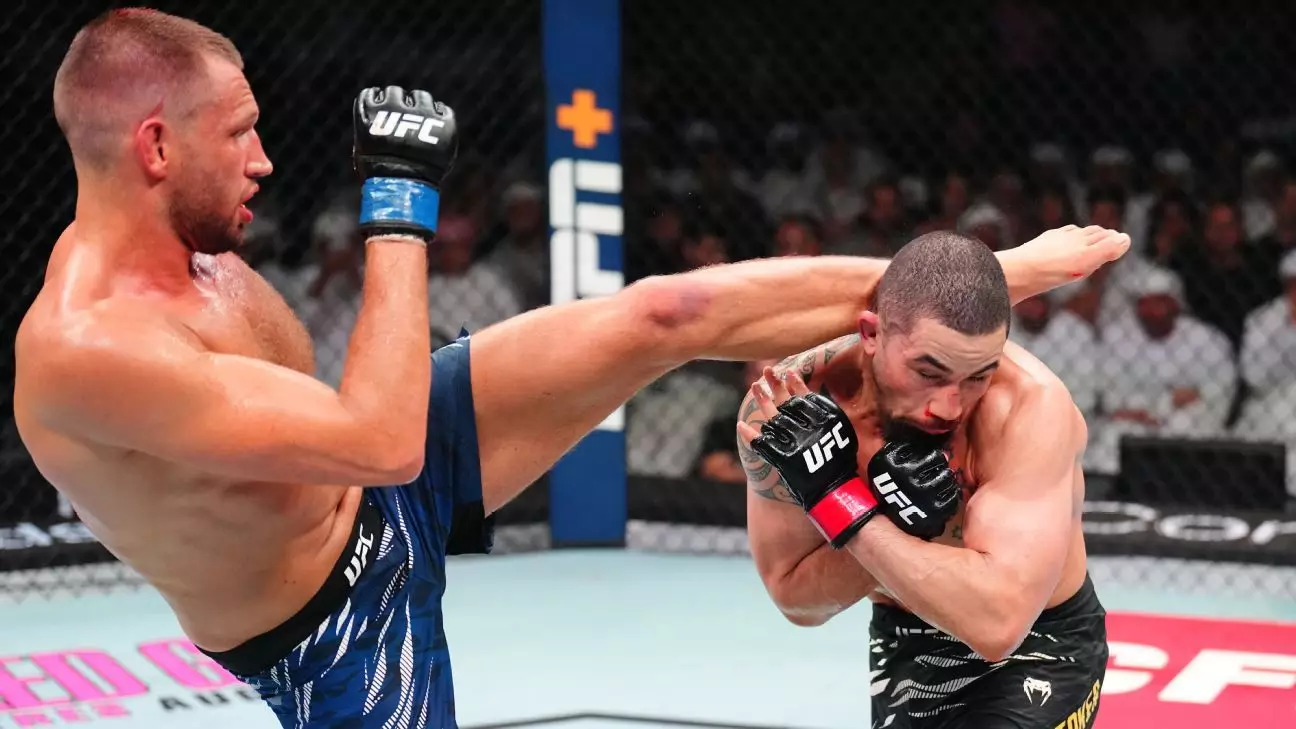In an electrifying contest that captured the attention of UFC fans worldwide, Reinier de Ridder demonstrated that he deserves a place at the top of the Middleweight division. By outlasting and outpacing legendary fighter Robert Whittaker in Abu Dhabi, de Ridder transformed from a promising grappler to a bona fide title contender. His victory, not simply a score on the judges’ cards, signifies a shift in perceptions about his skill set and potential. This fight was more than a display of physical endurance; it was a statement that strategic pressure, volume, and resilience can trump seasoned experience when executed with precision.
What stands out most about de Ridder’s win is the level of control he exerted throughout the fight. Outstripping Whittaker, a fighter renowned for his heavy hands and durability, de Ridder demonstrated that his approach is not purely grappling but a multi-faceted offensive arsenal. Despite the close split decision, the statistical dominance – in strikes landed and control time – underscores the confidence and tactical discipline de Ridder employed. This was not merely a grind-fest but a strategic battle in which he dictated the pace and rhythm against a fighter many considered to be more seasoned and dangerous.
Unpacking the Verdict: Was it an Upset or the Beginning of a New Chapter?
The split decision verdict reflected the subjective nature of MMA scoring, but the objective data paints a different picture. De Ridder’s 169 strikes to Whittaker’s 100 suggest a level of aggression and activity that is sometimes undervalued in close fights. Furthermore, controlling nearly nine minutes of the bout—whether along the fence or on the ground—showcases his relentless pursuit of dominance. A single moment — Whittaker’s knockdown in the third round — revealed the fight’s volatility; a reminder that in MMA, a single punch can turn the tide.
This victory amplifies de Ridder’s credentials and pushes him closer to genuine title contention. His willingness to press forward, combined with his ability to absorb punishing shots while maintaining control, displays a fighter who isn’t afraid of rugged battles. It’s a testament to his development over the last year, escalating from promising contender to legitimate threat. For fans and analysts alike, de Ridder’s rise asks an important question: Can he maintain this momentum against the division’s best, particularly against more dangerous strikers like Dricus Du Plessis or Chimaev?
The Significance for Whittaker and the Division’s Future
For Robert Whittaker, the loss is a significant setback—his first back-to-back defeats since 2013. Despite the setback, it’s important to acknowledge his resilience and skill, especially in surviving de Ridder’s pressure and bouncing back from a brutal exchange that could have ended differently. This loss is a stark reminder of how competitive and unforgiving the middleweight division has become, where even seasoned veterans face emerging contenders eager to carve their path to the top.
In the broader scope, de Ridder’s victory signals a shift in the division’s landscape. His callout for a title shot, specifically targeting next month’s bout between Chimaev and Du Plessis, shows his confidence and desire for high-stakes matchups. As he’s currently ranked No. 13, his trajectory upward is not just promising; it’s increasingly inevitable if he continues to display the tenacity seen against Whittaker. For the division, this means that new faces like de Ridder could soon dominate the headlines, challenging long-standing stalwarts and reshaping title aspirations.
Reflections on De Ridder’s Fighting Philosophy and Future Prospects
De Ridder’s approach in this fight reveals an evolving fight philosophy rooted in relentless pressure and volume. Usually regarded as a submission specialist, his willingness to engage in striking battles and control positions highlights an athlete unafraid to diversify his game. His recent wins over notable opponents demonstrate that he is not just a grappler but a multifaceted competitor willing to adapt and innovate.
Looking into the future, de Ridder’s ambitious callouts and his recent performances suggest he’s keen to test his skills against the division’s most dangerous. His goal—to finish opponents early and avoid long, grueling decisions—speaks to a fighter aiming for dominance rather than mere survival. The challenge now lies in translating individual victories into consistent, high-profile wins that can propel him into championship contention. If he remains focused and continues to grow, it’s only a matter of time before de Ridder is fighting for UFC gold, reshaping the division in his image.
This victory is more than just a W on record; it’s the heralding of a potential new era in middleweight MMA—one characterized by fierce pressure, technical versatility, and unwavering resilience. The division may have to prepare for a different kind of contender, one who refuses to be categorized solely by his grappling prowess but instead embodies a comprehensive fighting philosophy that can dominate across all ranges.

